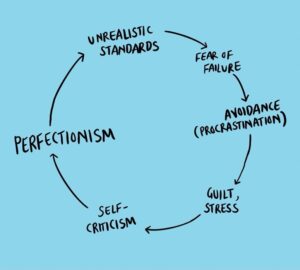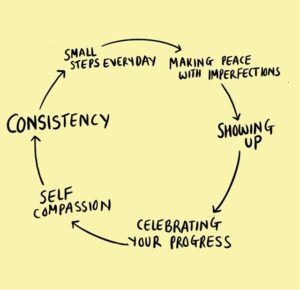Perfection is the willingness to be imperfect – Lao Tzu
When we think of the word “fitness,” many of us imagine buff people lifting heavy weights, and drinking a protein shake. Such posters are often plastered in front of every neighborhood gym. But is that everyone’s cup of tea? Are such high standards conducive to promoting fitness among the general public? Similarly, the concept of rigid and strict meal diets is associated with “a perfect healthy lifestyle.” But I believe that unrealistically high fitness standards serve only to deter people from adopting a healthier lifestyle. To avoid the fear of making mistakes, we end up procrastinating and not doing anything at all.
What is perfectionism?
Perfectionism is a personality trait where one sets unrealistically high expectations for oneself, strives for flawlessness, and indulges in extreme self-criticism (Longbottom et al., 2010). At the core of perfectionism lies the fear of failure or making mistakes. This is because a perfectionist judges their self-worth based solely on their accomplishments. A perfectionist is also at risk of experiencing intense disappointment, stress, anxiety, or depression when they fail to meet their flawless standards. To cope with these negative feelings, one would completely avoid doing a particular task altogether. Smith et al. (2017) analyzed the relationship between perfectionism and procrastination in 317 undergraduate students. Their research indicated that the fear of not meeting one’s self-expectations triggers procrastination.
Procrastination: A coping mechanism to perfectionism
A procrastinator delays working on a task although they are aware of the negative consequences (Steel, 2007). While procrastination is not always caused by perfectionism, it is often a coping mechanism to deal with stressful tasks (Smith et al., 2017). Fear of appearing incompetent combined with the stress of the looming deadline leads to complete avoidance. Procrastination is especially prevalent when task deadlines are far away or are not fixed. For example, instead of focusing on fitness habits with no deadline, it is more tempting to opt for instant gratification. This is why it’s so easy to postpone your workout and watch a Netflix episode instead!
We are all aware that we’re procrastinating or that we’re expecting impossible things from ourselves. We all also realize the importance of eating well and taking care of our physical and emotional well-being. Deep down, we all want to focus on our well-being. So why is it so challenging to stop putting off fitness habits? The answer lies in the (seemingly) endless cycle of perfectionism-procrastination, which traps us in.
The trap of perfectionism and procrastination

Perfectionism takes root in our minds when we set impossibly high standards for ourselves. In the context of wellness, this could be expecting high-energy performance in workouts, following a rigid diet, or pushing yourself too hard while ignoring your body’s signals. But, of course, after setting insanely high goals, a fear of failure follows. For a beginner, the idea of lifting heavy dumbbells or doing a HIIT session is justifiably intimidating. But, at the same time, realizing that you’re not exercising or you’re not eating healthy is stressful. So, we indulge in avoidance to cope with these negative feelings associated with wellness habits (which is nothing but …procrastination!). So, you see the vicious cycle here, don’t you?
The cycle of perfectionism followed by procrastination leads to feelings of guilt, shame, panic, and self-criticism. In fact, procrastination is linked to elevated psychological distress, including anxiety, stress, and depression (Eisenbeck et al., 2019). Furthermore, constantly indulging in self-criticism and stressing out over incomplete tasks is so mentally taxing. Wouldn’t you feel so much lighter if you didn’t always have to restrict yourself from doing the things you actually want to do?
So, how do we stop holding ourselves to insanely high expectations? How do we take the first step towards self-compassion and wellness?
Breaking the trap of perfectionism-procrastination
Try this for a change:
-
Consistency over perfection
Every one of us faces different moods on different days. If our moods are different, then how can we expect to perform optimally all the time? Instead, we can set our fitness goals intuitively by treating ourselves with compassion and paying close attention to our bodies needs. It is more important to take small steps every day than to aim for the perfect daily routine.
On days when I’m feeling under the weather or tired, I go for a light walk and feel refreshed instead of resenting myself for not working out. If I feel lazy, instead of procrastinating about going to the gym and lifting heavy weights, I work out at home. It’s much better to get something done in time than wait for it to be done “perfectly.” Because the waiting may never end. Taking the first step and showing up to fulfill your commitments is better than promising yourself you’ll do it “perfectly” tomorrow.
When you allow yourself not to be perfect all the time, you start realizing that there is nothing wrong with imperfection. We are all humans, after all.
-
Moderation over perfection
While building your fitness regime, you may be tempted to follow strict diets with no flexibility for your usual cravings. I did that too. But in the long run, it wasn’t sustainable and always crashed with binge-eating sessions and guilt. I realized that a plan based on restrictions is not bound to last long. Perfectionism and restrained eating are linked to binge-eating (Brusof and Levinson, 2017). Perfectionism often leads us to restrict our diet completely, making us feel guilty whenever we break the so-called rules we impose upon ourselves. Instead, we should focus on our body’s needs at the time and practice intuitive eating.
According to a randomized clinical trial conducted by Wilson et al. (2020), healthy eating and body acceptance increased in female university students after conducting “anti-dieting” group interactions. Rather than focusing on body weight, the group interactions emphasized body acceptance, intuitive eating, and rejecting diets.
Instead of trying to lay off on sweets or fried food completely, you can be guilt-free while eating them in moderation. There is nothing wrong with eating that slice of cake while celebrating with your friends! Or eating chocolate while having PMS!
-
Self-compassion over guilt
Breaking the cycle of perfectionism is not easy and takes time, with many ups and downs. The same old guilt will nag at you whenever you slip. It is important to replace guilt with self-compassion. Allow yourself to make mistakes, for they are the best opportunities to learn more about yourself.
A rule I follow which helps me avoid guilt and self-criticism is the 80% rule. As long as you completed even 80% of what you decided to do, it’s enough. The remaining 20% can be flexible depending on your circumstances and mood. If you’re working on yourself a little bit every day, you should be proud of yourself.
Building your new positive loop

The ultimate goal of the ‘unlearning’ process is building a thought process that is powered by self-compassion. You don’t have to achieve everything in a single day! Breathe. How about you start with the following small steps every day:
- Break down your goals into smaller achievable tasks
- Show up to your commitments no matter what
- Allow yourself to be imperfect
- Practice moderation and intuitive eating
- Be proud of yourself for being a ‘work in progress.
Click here to download a FREE checklist that you can stick on your fridge, and it can be a daily reminder to encourage you to show self-compassion and stay on track to achieving your life goals, whatever they may be.
REFERENCES
- Brosof, L. and Levinson, C., 2017. Social appearance anxiety and dietary restraint as mediators between perfectionism and binge eating: A six month three wave longitudinal study. Appetite, 108, pp.335-342.
- Eisenbeck, N., Carreno, D. and Uclés-Juárez, R., 2019. From psychological distress to academic procrastination: Exploring the role of psychological inflexibility. Journal of Contextual Behavioral Science, 13, pp.103-108.
- Longbottom, J., Robert Grove, J. and Dimmock, J., 2010. An examination of perfectionism traits and physical activity motivation. Psychology of Sport and Exercise, 11(6), pp.574-581.
- Smith, M., Sherry, S., Saklofske, D. and Mushqaush, A., 2017. Clarifying the perfectionism-procrastination relationship using a 7-day, 14-occasion daily diary study. Personality and Individual Differences, 112, pp.117-123.
- Steel, P., 2007. The nature of procrastination: A meta-analytic and theoretical review of quintessential self-regulatory failure. Psychological Bulletin, 133(1), pp.65-94.
- Wilson, R., Marshall, R., Murakami, J. and Latner, J., 2020. Brief non-dieting intervention increases intuitive eating and reduces dieting intention, body image dissatisfaction, and anti-fat attitudes: A randomized controlled trial. Appetite, 148, p.104556.
